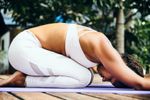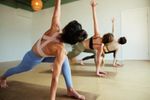Research finds yoga to be uniquely powerful: the more you do, the better you feel.
Although yoga has a reputation for being both physically challenging and mentally restorative, its unparalleled ability to mitigate mental health struggles isn't well understood.
To help illuminate that, we're dusting off a watershed 2019 meta analysis published in the British Journal of Sports Medicine validating that movement-based yoga improves a range of mental health conditions, including depression, generalized anxiety, mood disorders, post-traumatic stress disorder and more. Lead researcher Jacinta Brinsley told Medical Xpress that the findings are “very good news for people struggling in times of uncertainty.”
And now definitely qualifies as time of uncertainty.
The yoga practices studied all included a mix of movement, breathing exercises and/or mindfulness, but the movement component (or asana) comprised at least 50 percent of the session. Still, it's the blend of those modalities — not found in many other activities — that is thought to lend yoga its therapeutic power. Another finding: The more weekly sessions completed, the greater the effect on easing depressive symptoms.
The more weekly yoga sessions completed, the greater the effect on easing depressive symptoms.
"Perhaps the most encouraging news from this study is that it doesn't appear to matter what style of yoga you practice — just that you practice," adds Joyce Englander Levy, NYC-based yoga teacher. "Whether you like to link your breath to movement and smoothly flow from pose to pose, or you prefer to focus on alignment work on endurance, the mental and emotional benefits will be there for you." Sound soothing? Here’s a simple morning yoga sequence to get started.
RELATED: What to Eat When You Have Anxiety
According to Harvard Health, past available research also suggests that yoga can reduce the impact of stress and alleviate symptoms of anxiety and depression — with or without the presence of a diagnosed mental illness. It’s theorized that yoga does this by modulating our stress response systems — or moving us from a fight-or-flight to a rest-and-digest response.
Best of all, yoga is a (mostly) equipment-free, inclusive form of exercise that can be done at home or in a class setting.
To learn about the yoga offerings at THE WELL New York, go here.




